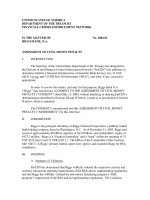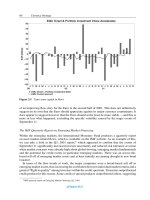GUIDE TO THE FEDERAL CREDIT BUREAU PROGRAM - A COMPANION TO THE TREASURY FINANCIAL MANUAL CREDIT SUPPLEMENT ppt
Bạn đang xem bản rút gọn của tài liệu. Xem và tải ngay bản đầy đủ của tài liệu tại đây (940.95 KB, 88 trang )
TABLE OF CONTENTS
PREFACE
CHAPTER 1
INTRODUCTION
Purpose of Guidelines 1-1
Background 1-3
Definitions 1-4
Distinction between Commercial and Consumer Debt 1-6
When to Report Debts to Credit Reporting Agencies (Reporting Cycle) 1-6
Credit Extension 1-7
Account Servicing 1-7
Debt Collection 1-8
Write-Off and Close-Out 1-8
"Individual Service Agreements" and Memoranda of Understanding (MOUs) 1-9
Obtaining Credit Reports 1-10
Credit Bureau Reporting Made Easy 1-12
Special Rules/Laws Applicable for Reporting Debts 1-13
CHAPTER 2
REPORTING CONSUMER ACCOUNT INFORMATION
Reporting Consumer Accounts . . . 2-1
Special Rules for Reporting Consumer Account Information 2-1
Legal Requirements 2-2
60-Day Notice of Intent to Report to Credit Bureau 2-3
Handling Disputed Information in Consumer Debtor Files 2-5
Summary of Procedures Disputing Accuracy of a Credit Report 2-7
Procedures to be used When Debt Goes from "Current" to "Delinquent" Status 2-8
Reporting Debts Being Collected by FMS' Debt Management Service (DMS) 2-9
General Instructions 2-10
Use of the Metro 2 Format for Referring Information to Credit Reporting Agencies 2-12
Reporting Consumer Account Information . 2-13
Federal Agency Identifiers 2-14
Important Debtor Identification Elements 2-14
Summary 2-17
CHAPTER 3
REPORTING COMMERCIAL ACCOUNT INFORMATION
Reporting Commercial Accounts 3-1
General Instructions 3-1
Reporting Debts Being Collected by FMS' Debt Management Service (DMS) 3-3
Handling Disputed Information in Commercial Debtor Files 3-4
Commercial Account Data Elements . . 3-4
Identification Elements 3-4
Debt Elements 3-5
TABLE OF CONTENTS
Current Activity Elements (Status Codes) 3-6
Agency Identification Elements 3-10
Summary 3-11
Automated Reporting Format for Commercial Debt 3-12
Comments & Tables 3-14
Current Activity Status Codes 3-15
Frequency of Payment 3-16
Type of Debt 3-16
APPENDICES
Appendix 1 - Section 3711(e) of Title 31, United States Code A-1
Appendix 2 - (Model) Memoranda of Understanding for Reporting of Consumer and Commercial Debts A-5
Appendix 3 - Credit Reporting Agency Contacts A-23
Appendix 4 - Sample FMS Debt Management Cross-Servicing Implementation Agency Profile Form A-25
Appendix 5 - Commonly Used Federal Agency Codes A-27
Chapter 1 Introduction
Purpose of Guidelines
These guidelines apply to ALL Federal Executive,
Legislative and Judicial agencies, including
Government corporations. The purpose of this document
is to provide guidance to Federal agencies for reporting
information on Federal debts (consumer and commercial)
to designated credit reporting agencies. The guidelines are
consistent with the Debt Collection Act of 1982 (DCA), as
amended by the Debt Collection Improvement Act of 1996
(DCIA), the revised Federal Claims Collection Standards
(31 CFR Parts 900-904) published November 22, 2000, the
revised Office of Management and Budget (OMB) Circular
No. A-129 published November 29, 2000, and the
Financial Management Service (FMS) publication
“Managing Federal Receivables” (revised May 2005).
Relevant portions of the DCA and the DCIA are codified at
31 U.S.C. § 3711(e) (see Appendix 1
) and 3720(B).
This document supersedes the previous “Guide to Federal
Credit Bureau Reporting” which was published in 1991.
This guide will be periodically updated to include new
information as it develops.
Since 1991, numerous changes have occurred, most
notably:
(a) The DCIA, enacted in 1996, requires agencies to report
to credit reporting agencies, information on all
delinquent
consumer debts owed to the Federal Government;
(b) The DCIA authorizes agencies to report accounts in
good standing to credit reporting agencies. Reporting
accounts in good standing ensures that all
relevant Federal
debtor data is integrated into the credit reporting agency
databases and is available for consideration when credit
decisions are made and prevents overextension of credit;
Introduction
1-2
(c) The DCIA requires that lenders financing and/or
extending credit on behalf of the Federal Government be
required to provide information relating to the extension of
credit to consumer and commercial credit reporting
agencies. Submission of debtor information to designated
credit reporting agencies should be a routine and ongoing
part of Federal agencies and certified lenders account
servicing and
debt collection procedures for both consumer
and commercial accounts;
(d) The revised Federal Claims Collection Standards,
published in November 2000 clarify and simplify Federal
debt collection procedures (and reflect changes under the
Debt Collection Improvement Act of 1996 and the General
Accounting Office Act of 1996); and
(e) The “Metro 2” format for reporting consumer debt,
developed by the credit reporting industry, is designed to
capture better data for debtor records within the credit
reporting agency databases. The Metro 2 format increases
the accuracy of debtor files which subsequently produces a
better credit report and provides additional features for the
report user. The format is the industry standard for
providers of information. See Chapter 2 for additional
information on the Metro 2 format.
The Financial Management Service (FMS) is available to
meet with Federal agencies to assist with the reporting
effort, including facilitation of the Memoranda of
Understanding (MOUs) between Federal agencies and the
designated credit reporting agencies receiving Federal
debtor data. “Model” consumer and commercial MOUs are
located at Appendix 2. The MOUs in Appendix 2 can
can be reproduced and used to enter into agreements
with the credit reporting agencies. Contacts for credit
reporting agencies and FMS are listed in Appendix 3.
Introduction
1-3
In addition to this document, the following materials
provide guidance on reporting to credit reporting agencies:
C OMB Circular No. A-129 “Policies for
Federal Credit Programs and Non Tax
Receivables” (Revised);
C “Federal Claims Collection Standards”
(Revised) (See 31 C.F.R.§
901.4); and,
C FMS Publication “Managing Federal
Receivables”(Revised May 2005).
Agencies should review Office of Management and Budget
(OMB) Circular No. A-129 for policies on the use of credit
reports for the purpose of screening and determining
creditworthiness of applicants for Federal financial
assistance or persons seeking to do business with the
Government.
Background
The Debt Collection Act of 1982 gave agencies the
authority to report delinquent nontax, non-tariff consumer
debts to credit reporting agencies provided that Federal
agencies follow detailed procedures.
The DCIA was enacted through the cooperation of major
Federal Government credit granting agencies, the OMB,
the Chief Financial Officers Council and the Department of
the Treasury. The DCIA significantly enhanced the Debt
Collection Act of 1982. The DCIA requires
Federal
agencies to report to credit reporting agencies, information
on all delinquent Federal consumer debts. The DCIA also
authorizes
the submission of information on consumer
debtors considered as “current
.” Federal agencies have
been required, as a matter of policy, to report all
(current
and delinquent) commercial debts since September 1983.
Introduction
1-4
This requirement was subsequently incorporated into OMB
Circular A-129 and the Federal Claims Collection
Standards. As detailed later in this document, agencies are
encouraged to report their entire debt portfolios (current
and delinquent debts).
Definitions
A “claim” or “debt” (used interchangeably) means any
amount of money, funds or property that has been
determined by an appropriate official of the Federal
Government to be owed to the United States by a person,
organization or entity other than another Federal agency.
Section 3701(b) of Title 31 of the United States Code
defines a “debt
” or “claim” to include:
C funds due to the United States on account of
loans made, insured or guaranteed by the
Government, (including any deficiency or
difference between the price obtained by the
Government in the sale of a property and the
amount due to the Government on a
mortgage on the property);
C expenditures of non-appropriated funds;
C overpayments;
C any amount the U.S. is authorized by statute
to collect for the benefit of any person;
C the unpaid share of any non-Federal partner
in a program involving a Federal payment
and matching or cost sharing payments by
the non-Federal partner;
Introduction
1-5
C fines or penalties assessed by an agency; and
C any other amounts of money or property due
to the Government other than delinquent
taxes and tariffs.
“Accounts receivable
” are generated by all Federal
agencies. Examples of accounts receivable are
: fines,
fees, penalties, forfeitures, royalties, audit disallowances,
claims, rents, damages, overpayments, and other amounts
owed to the Government.
“Credit reporting agency” (also known as “credit
bureau”)- Major consumer and commercial credit
reporting agencies that have signed agreements
Memoranda of Understanding (MOUs) with Government
agencies to receive and integrate credit information (data)
from voluntary subscribers (Federal agencies and private
sector entities) into their respective database. In turn, this
information is sold, oftentimes by smaller credit reporting
agencies, to purchasers of credit data (in the form of credit
reports and other products). The credit report, etc., is used
to determine creditworthiness, conduct credit scoring, assist
with collection efforts, or for other permissible purposes as
defined by the Fair Credit Reporting Act. (See Appendix 3
for designated credit reporting agencies.)
“Non-exclusive basis
” - Federal agency debtor account
information is reported to each
of the designated credit
reporting agencies receiving Federal debtor data.
(Agencies should attempt to resolve issues which prevent
reporting in this manner.)
Introduction
1-6
When to Report Debtor
Information
Credit
Extension
Debt
Collection
Write-Off/
Close Out
Account
Servicing
Submit accounts
to credit reporting
agencies during:
Distinction between Commercial and Consumer Debt
In accordance with the definitions contained in “Managing
Federal Receivables,” the term “commercial” signifies a
business activity and the term “consumer” signifies a
personal activity. The purpose of the activity, not the
type of entity involved, determines whether a debt is
classified as commercial or consumer.
For example, a loan to a farmer to obtain additional land or
equipment for farming would be considered a commercial
loan; whereas a loan to the same farmer to purchase a
personal residence would be a consumer loan.
When to Report Debts to Credit Reporting Agencies (Reporting Cycle)
There are four points in the credit management and debt
collection cycle when Federal agencies should make use of
credit reporting agencies. As part of its financial
management responsibility, an agency should report
information on its Federal debtors to credit reporting
agencies in the following circumstances:
Introduction
1-7
C Credit Extension - Under the DCIA heads of
agencies must, as a condition for insuring or
guaranteeing any loan, financing, or other extension
of credit under any law to a person, require that the
lender provide information relating to the extension
of credit to consumer reporting agencies or
commercial reporting agencies, as appropriate.
Additionally, pursuant to 31 U.S.C. § 3720B,
Federal agencies may not grant a loan or loan
guarantee to a person or entity which owes
delinquent nontax debt to the Federal government.
See 31 C.F.R. § 285.13. Agencies are required by
OMB Circular No. A-129 to screen potential
applicants for Federal financial assistance for
creditworthiness. The applicants’ credit history
(credit report) also becomes a part of the official
loan origination files. In instances where a
delinquent Federal tax or nontax debt has been
reported and is reflected in the applicant’s credit
history, agencies should immediately suspend loan
processing (unless statutorily prohibited). In
instances where the loan, etc. has been approved,
the indebtedness should be reported to a credit
reporting agency after funds have been disbursed.
C Account Servicing
- Once a loan is awarded and
disbursed, or a financial obligation to repay an
administrative debt has been established, the
Federal agency (or in the case of a guaranteed loan,
the lender) becomes responsible for servicing or
controlling the account. Federal agencies may
provide to consumer reporting agencies or
commercial reporting agencies information from a
system of records that a person is responsible for a
claim which is current. If account servicing has
been contracted out or a lender is servicing the
account, agencies must require the servicer or
lender to make the initial referral of debtor account
information to credit reporting agencies and to
provide accurate and consistent account status
Introduction
1-8
updates.
C Debt Collection - Reporting debts to credit
reporting agencies is an essential part of an
agency’s debt collection efforts. In accordance with
Federal law, agencies must report information on all
Federal delinquent consumer debtors to credit
reporting agencies. Regulations and policies
governing commercial debtors are covered in OMB
Circular No. A-129 (revised November 2000) and
the Federal Claims Collection Standards (revised
November 2000). With some exceptions, Federal
agencies must not extend credit assistance to
debtors owing unresolved delinquent debts to the
Government (see 31 U.S.C. § 3720B and 31 C.F.R.
§ 285.13). When debts have been transferred to
FMS or a designated debt collection center for
collection pursuant to the DCIA, FMS or the debt
collection center, as appropriate, will perform debt
collection activities (which include referral of
accounts to credit reporting agencies if requested by
the transferring agency).
Prior to reporting delinquent consumer debts to
credit reporting agencies, agencies must provide
consumer debtors certain rights of due process
which are detailed in Chapter 2, “Reporting
Consumer Account Information.”
C Write-Off and Close-Out
- An effective
receivables management program must include the
systematic write-off and close-out of uncollectible
debts pursuant to OMB Circular A-129.
Essentially, once the debt is written-off, the agency
must either classify the debt as currently not
collectible (CNC) or close-out the debt. If an
agency determines that continued collection efforts
after write-off are likely to yield higher returns in
the future, then the debt is not closed out but
Introduction
1-9
classified as CNC and reporting to credit reporting
agencies should continue. Once the agency
determines it is no longer cost effective or legally
possible to pursue collection, the debt should be
closed-out and all collection activity ceased. The
account’s status is forwarded to the credit reporting
agencies receiving Federal data. Agencies should
consult OMB Circular A-129 for details.
“Individual Service Agreements” and Memoranda of Understanding (MOUs)
In past years, many agencies signed “Individual Service
Agreements” with credit reporting agencies to accept, store
and integrate Federal data into credit reporting agency
databases. While FMS does not require termination of
these agreements, the Memoranda of Understanding
(MOUs) promote standardization of the reporting process
government wide and are consistent with current law.
Agencies are encouraged to enter into the MOUs at the
expiration of their current service agreements. The MOU
should be signed by the Federal agency Chief Financial
Officer or the designee and the appropriate credit reporting
agency official. Federal agencies should also have their
counsel review current agreements to determine whether
they are compliant with current law and policy.
The MOUs obligate Federal agencies to provide credit
information on their accounts to the particular credit
reporting agencies signing the MOU. In turn, the credit
reporting agencies agree to accept, load, store, and
incorporate this information into their data files and credit
information. This ensures that when a Federal agency or
private sector lender purchases a credit report on an
applicant or debtor, the Government’s information is
reflected in the report purchased.
Introduction
1-10
Obtaining Credit Reports
The smaller credit reporting agencies authorized by the
General Services Administration (GSA) on the Federal
Supply Schedule (FSS) to provide credit reports for Federal
agencies must purchase their information from the
designated credit reporting agencies listed at Appendix 3.
Federal agencies should use the FSS for the purchase of
credit reports and related information, unless circumstances
dictate otherwise. Purchasing credit reports through the
FSS is no different from purchasing other items through the
GSA’s FSS.
Agencies are required by OMB Circular No. A-129 to
purchase credit reports for screening loan applicants.
Where appropriate, Federal agencies should obtain
information (credit reports) on loan applicants from both
commercial and
consumer credit reporting agencies prior to
extending credit or other Federal assistance. Credit reports
should also be purchased at other times throughout the
credit cycle:
C to verify a debtor’s claim of financial inability to
pay a debt in a lump sum, as is required prior to
entering into an installment agreement;
C to reassess a debtor’s financial position when
considering rescheduling a debt or otherwise
entering into a workout agreement;
C to evaluate administrative offset and other debt
collection possibilities; and
C to meet the requirement that an agency provide
credit data on a debtor when referring a debt for
litigation.
Introduction
1-11
The agency’s cost to purchase a credit report or other credit
information should be passed along to the borrower/debtor:
(a) through the application fee when used to determine
creditworthiness and eligibility during credit extension;
and, (b) as an administrative cost when used after the debt
becomes delinquent.
Introduction
1-12
Credit Bureau Reporting Made Easy
Action Required
Consumer
Reporting
Commercial
Reporting
1. Sign Memoranda of Understanding (MOU) with credit reporting
agencies (see “Model” Memoranda of Understanding at Appendix 2)
facilitated by the Financial Management Service, Debt Management
Services. See Appendix 3 for Treasury/FMS contact information.
YES YES
2. Contact the consumer and/or commercial credit reporting agencies
receiving Federal debtor data to establish reporting relationship (contacts,
addresses, etc.). Agencies are reminded that data should be sent on a non-
exclusive basis (data should be sent to each of the credit reporting
agencies). See Appendix 3 for credit reporting agency contacts.
YES YES
3. Agree with each credit reporting agency on the method in which data
will be sent. (tapes, disks, electronically, etc.)
YES YES
4. Prepare data for submission to credit reporting agency.
NOTE: Reporting Cycles
Consumer - Report Monthly-(more frequent updates may be made as
required)
Commercial - Report Quarterly-(more frequent updates may be made as
required)
YES YES
5. Complete “Transmittal of Account Information” sheet to accompany
tape, etc. (Attachment A to MOU)
YES YES
6. Submit data to credit reporting agencies. The credit reporting agencies
will return all tapes to the respective agency after the data has been loaded
into the respective databases. Agencies are encouraged to work to
establish procedures to ensure that the information has been loaded and is
being properly reported by the credit reporting agencies.
YES YES
7. Prepare quarterly report to Financial Management Service (Attachment
B to MOU).
YES YES
Introduction
1-13
Special Rules/Laws Consumer
Account
Data
Commercial
Account
Data
The Privacy Act of 1974, as amended - Promotes greater governmental
respect for the privacy of citizens.
YES MAY
APPLY*
Debt Collection Act of 1982 (DCA) - Increases the efficiency of
government wide efforts to collect debts owed to the United States and to
provide additional procedures for the collection of those debts. YES YES
DCA due process requirements include: Requirement for 60-day notice to
debtor before submission of delinquent debtor data to credit reporting
agencies. See Chapter 2 - Reporting Consumer Accounts
YES N/A
Debt Collection Improvement Act of 1996 (DCIA ) - Requires the
reporting of all nontax delinquent consumer debts to credit reporting
agencies.
YES N/A
The DCIA authorizes the reporting of current consumer and commercial
debts.
YES YES
OMB Circular No A-129, dated November 29, 2000 - Provides regulatory
guidance consistent with the DCA and the DCIA regarding the referral of
accounts to credit reporting agencies. Instructs agencies to report all
current and delinquent commercial debts.
YES YES
The Department of the Treasury, Financial Management Service’s
“Managing Federal Receivables” - provides program guidance to Federal
agencies on reporting of information to credit reporting agencies.
YES YES
Justice/Treasury “Federal Claims Collection Standards”- dated
November 22, 2000 - Regulations governing Federal debt collection
procedures (including the use of credit reporting agencies).
YES YES
*Consult with Agency Counsel
2-1
Chapter 2 Reporting Consumer Account Information
Reporting Consumer Accounts
The purpose of this chapter is to provide general
instructions for reporting account information on
consumer debts
to credit reporting agencies.
Special Rules for Reporting Consumer Account Information
The reporting of information on individual consumers is
governed by certain laws, regulations and policy guidance,
including:
C The Privacy Act of 1974 as amended - Promotes
greater governmental respect for the privacy of
citizens.
C Debt Collection Act of 1982 (DCA) as amended by
the Debt Collection Improvement Act of 1996
(DCIA) - increases the efficiency of government
wide efforts to collect debts owed to the United
States and to provide additional procedures for the
collection of those debts.
C DCIA - The DCIA requires
the reporting of all non
tax delinquent
consumer debts to credit reporting
agencies. The DCIA also authorizes
the
reporting of current consumer and commercial
debts.
C OMB Circular No. A-129 - Provides regulatory
guidance consistent with the DCA and the DCIA
regarding the referral of accounts to credit reporting
agencies.
Reporting Consumer Account Information
2-2
C Justice/Treasury Federal Claims Collection Standards -
regulations governing Federal debt collection procedures
(including the use of credit reporting agencies).
C The Department of the Treasury, Financial Management
Service’s Managing Federal Receivables - includes
guidance to Federal agencies on reporting information to
credit reporting agencies.
Legal Requirements
Federal agencies are legally required to follow certain procedures
when reporting delinquent consumer
debts to credit reporting
agencies. Prior to reporting a delinquent consumer debt to a credit
reporting agency, a Federal agency must:
C comply with the provisions of the Privacy Act of 1974.
See 31 U.S.C. § 3711(e)(1)(A). Agencies should consult
their counsel in order to comply with Privacy Act
requirements.
• establish procedures to:
– disclose promptly to consumer reporting agencies
substantial changes in the condition or amount of a
debt;
– verify or correct promptly information about a debt
on request of a consumer reporting agency for
verification of information (see section entitled
“Handling Disputed Information in Consumer
Debtor Files”on page 2-5); and
– get satisfactory assurances that consumer reporting
agencies are complying with Federal laws related to
providing consumer credit information. See 31
U.S.C. § 3711(e)(1)(E).
Reporting Consumer Account Information
2-3
C take reasonable action to locate a person about
which the information will be reported for whom
the agency does not have a current address. See 31
U.S.C. § 3711(e)(3).
• review the debt to be reported and decide that the
debt is valid and overdue. See 31 U.S.C. §
3711(e)(1)(B).
• determine that the person about which the
information will be reported has not:
– entered into a written repayment plan with
the Federal agency; or
– filed for a review of the debt. See 31 U.S.C.
§ 3711(e)(1)(D).
• send a notice to the person about which the
information will be reported at least 60 days prior to
reporting a debt to a credit reporting agency (see
“60-day Notice of Intent to Report to Credit
Bureau,” below) and notify the person that he or she
is entitled to a complete explanation of the debt, to
dispute information in the records about the debt,
and to an administrative repeal or review of the
debt. See 31 U.S.C. § 3711(e)(1)(C).
• provide for a review of the debt upon request,
including an opportunity for reconsideration of the
initial decision. See 31 U.S.C. § 3711(e)(2).
60-Day Notice of Intent to Report to Credit Bureau
Pursuant to 31 U.S.C. § 3711(e), when reporting
information on delinquent consumer accounts, the debtor
must be notified 60 days in advance of such reporting to the
credit reporting agency. Agencies should provide this
notice in the initial billing notice or demand letter, but no
later than the second demand letter sent by the agency.









